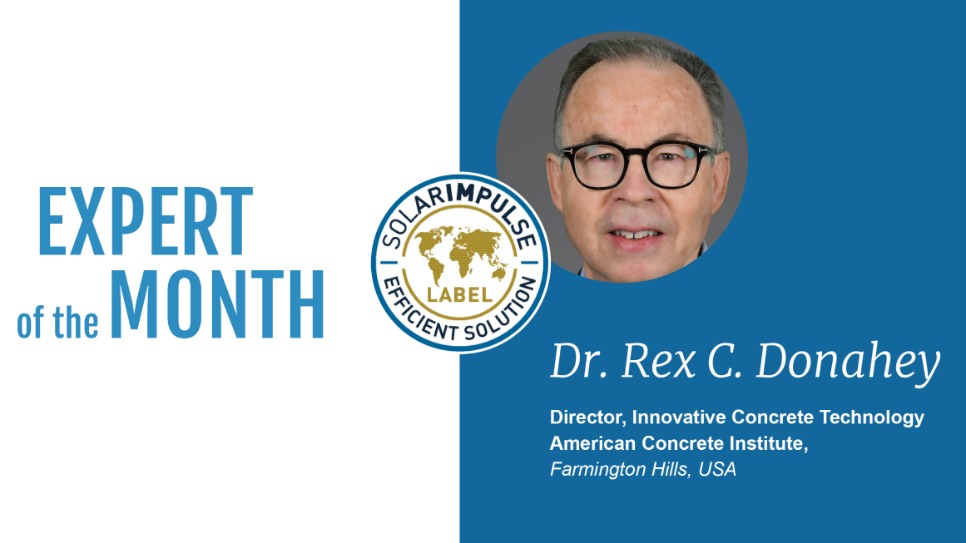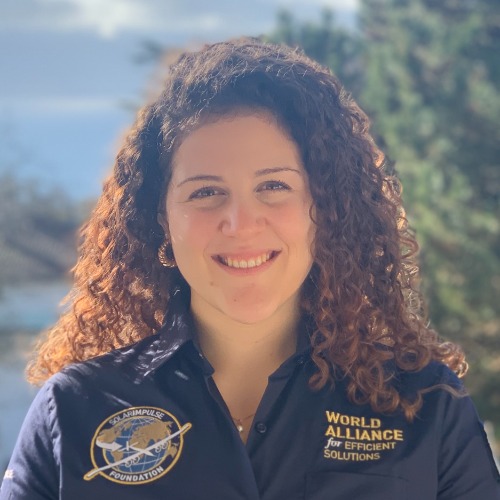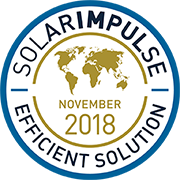Interviews - September 1, 2023
September's Expert of the Month: Dr. Rex Donahey!


Written by Sofia Iorio 3 min read
Comprising a dynamic group of professionals spanning various disciplines within sustainability, clean technologies, and innovation, the Solar Impulse Foundation Expert Community embodies a collective force driving positive change. In alignment with the Solar Impulse Foundation's commitment to sustainability and innovation, we proudly present our Expert of the Month, Dr. Rex Donahey! With a Ph.D. in Engineering and a diverse background in academia and industry, he brings a wealth of expertise to our Expert community.
September's Expert of the Month: Dr Rex Donahey!
His work in low-carbon materials, real-time concrete monitoring, and resource-efficient construction methods embodies his passion for sustainability. Our Expert of the Month envisions an industry that minimizes waste and maximizes resource efficiency.
Could you provide us with a brief introduction to your background and experiences?
I grew up on a farm in Kansas and lived in Oklahoma, Illinois, and Iowa before moving to my current home in Farmington Hills, Michigan. I earned a PhD in Engineering from the University of Kansas.
Would you tell us more about your area of expertise?
My research experience includes analysis and testing of reinforced concrete, structural steel, and fiber composite structures. In addition to teaching structural engineering at two universities, I have worked in a structural design office and served as the director of engineering and research for a manufacturer of products for the construction industry. More recently, I served as the Editor-in-Chief of Concrete International, the magazine of the American Concrete Institute. In that role, my goal was to help experts in construction, materials, and structural design communicate their expertise to a broader audience. If I had to identify a specific area of expertise for myself, it might be an enduring curiosity about how things work. Fortunately, massive open online courses (MOOCs) have made it possible for me to study machine learning, robotics, materials, augmented reality, and design thinking in my free time.
Can you provide an overview of your role as the Director of Innovative Concrete Technology at the American Concrete Institute?
In my current role, I identify emerging technologies that will enhance the productivity, resilience, or sustainability of concrete construction; and I help innovators match their solutions to industry needs.
Could you share some of the latest advancements or breakthroughs in concrete technology that you have been involved with?
I’ve worked with teams developing low-carbon alternatives to Portland cement, materials that can protect concrete from cyclic freezing and thawing, sensors that can monitor concrete properties in real time, and augmented reality systems that will improve productivity and quality.
How did your interest in sustainability-related topics evolve and what inspired you to become involved in these areas?
I suppose my interest in sustainability dates to the 1970s, when I read The Limits to Growth by Meadows, Meadows, Randers, and Behrens. Through the years, my work within the construction industry has added impetus, as the built environment generates about 40% of annual global CO2 emissions.
With a growing focus on circular economy principles, how do you envision the concrete industry adapting to maximize resource efficiency and minimize waste?
Our industry must maximize the durability and resilience of our completed projects, even as we use new binders and incorporate increasing amounts of recycled materials in our concrete.
As you reflect on your Assessments, could you elaborate on the nature of solutions you've reviewed, and point out those that you find to be the most impactful in your view?
My assessments have included products that increase the toughness of existing materials, thereby minimizing the footprint of new construction; a construction system that has minimal shipping volume, thereby minimizing the number trucks required for delivery; and an assessment and software system that identifies opportunities for upgrading and maintaining buildings, thereby minimizing energy and repair costs for building owners. The latter solution could be the most impactful in future because it is scalable, demonstrates systems thinking, and could be applied for the management of all types of facilities.
What aspirations and expectations do you hold for the Solar Impulse Foundation's future impact?
I hope the foundation’s assessments will encourage consumers, facility owners, and public officials to consider the impacts of the products they use and specify. Further, I hope the assessments will serve as benchmarks that inspire future innovators to create even better products and systems.

Written by Sofia Iorio on September 1, 2023








